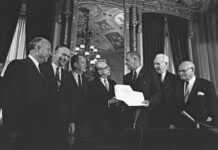Colonel Charles Young, Brigadier General Benjamin O. Davis, General Roscoe Robinson, Sr, Brigadier General Hazel W. Johnson, Major General Charles C. Rogers.
By: Charles Blatcher, III
Chairman, National Coalition of Black Veteran Organizations
This article is written to pre-empt a possible problem that could cause a delay in getting the names changed on the Army Bases currently honoring Confederate Generals. Everybody has a favorite uncle or aunt they believe should have a base named in their honor. In January when we were informed the legislation had been signed authorizing the name changes, we submitted our recommendations to Congressman Anthony Brown, a member of the Armed Services Committee. We felt it important to suggest a common-sense approach for the name selection process. Otherwise, the process could easily be argued about who is the worthiest of the honors.
The Congressional Black Caucus raised the issue calling for the renaming of the select United States Army Bases. The Coalition has been a principal advocate for the cause. We communicated with Congressional Leaders and Army General Mark A. Milley, chairman of the Joint Chief of Staff expressing our view regarding the necessity for the change. We reached out to the Department of the Army and Congress seeking the regulations or legislation that affirmed the existing names. One would surmise there was a selection process, and such documents exist. We never acquired the documentation. Without a selection process Benedict Arnold would have likely been chosen to be honored.
Nevertheless, we welcomed the announcement that the decision was made to change the names of the ten bases. It has been a long time coming, but it has come. The Coalition being involved since 2017 shares the joy and success of the legislative accomplishment.
We selected names for five of the bases to be renamed. The number was derived because the Black contribution spans the longest period of our nation’s history. Black participation also constitutes the largest minority presence in American Military History. The Native American, Hispanic, Japanese, and Hawaiian American communities have their own first for consideration in the process.
The recommendation we sent forward were the following with the brief histories supporting the choices. In our suggested process history makes the determination. Our choices represent the first in United States Army Military History, all are deceased. The latter point is a prerequisite for consideration.
– Colonel Charles Young, First Black Colonel in Army History. Highest ranking Black Officer in the Armed Forces from 1894 to his death in 1922.
– Brigadier General Benjamin O. Davis, Sr, First Black General in US Military History- 1941
– General Roscoe Robinson, First Black Army Four Star General in US Army History – 1984
– Brigadier General Hazel W. Johnson, First Black Woman General – 1979
– Major General Charles C. Rogers. Only Black General recipient of the Medal of Honor – 1968
A Base named after Brigadier General Hazel Johnson would be especially historic. There has never been a base named neither for a woman nor a Black Soldier.
Lieutenant Henry O. Flipper, the first Black Graduate of West Point is not included in our choices because of the complication presented by his Court Martial and subsequent pardon. We have long held the belief he should have been exonerated. There is a difference between the two. Pardon implies you did something, but you are excused. Exoneration means you are innocent of charges. The Law Firm who represented Flipper’s case found it more expedient to seek the pardon then try to prove his innocence.
We are hopeful this process moves forward without becoming the equivalent of an adult food fight. This is a historical moment in this nation’s history. We encourage the public to view the moment in its historical context. None comes before the First. Think About It.
##### Contact information: email address cnmmmf@aol.com







